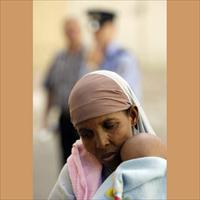Djibouti women and children in the spotlight

UNICEF’s Regional Director, Sigrid Kaag, concludes 3-day visit
Sigrid Kaag, UNICEF Regional Director for the Middle East and North Africa has concluded a three-day visit to Djibouti. During her trip Kaag met with the President of the Republic, HE. Ismael O. Guelleh, several members of the cabinet, representatives of NGOs, local associations and communities.
Located at the Southern entrance to the Red Sea, Djibouti shares a border with Ethiopia, Somalia and Eritrea. In Djibouti, extreme poverty affects 42 per cent of the population while 74 per cent are affected by relative poverty.
Ms. Kaag stated during a press conference: “The visit to Djibouti has given me first hand experience of the conditions of women and children in the country, and has provided me with greater insight as to their immediate needs”. She commended Djibouti’s progress towards the Millennium Development Goals (MDGs) especially with regards to a reduction in child mortality rates, as well as increased access to primary education for girls and boys. The Regional Director took note of progress made in gender parity in primary education. At the same time she expressed concerns about remaining disparities between the rural and urban areas in the social sectors.
Ms. Kaag raised the issue of continued high rates of malnutrition, affecting a significant part of the population, and particularly children under the age of five as well as pregnant and lactating women. One child in five is affected by acute malnutrition. UNICEF will support the Government and its partners to further improve food security as well as the nutritional status of vulnerable groups in the country.
“Maternal mortality levels are still too high and UNICEF will work with partners to further reinforce efforts underway” said Ms. Kaag.
UNICEF’s Regional Director for Middle East and North Africa praised Djibouti for its leadership for the eradication of Female Genital Mutilation/Cutting.
In Djibouti, Ms Sigrid Kaag visited a center which offers services to prevent transmission of HIV from parents to child; therapeutic and supplementary nutrition centers; a counseling center for women affected by violence and a center in a peri-urban area of town where HIV counseling services are offered to the local population as well as migrant workers from neighbouring countries; a newly constructed school in a rural area where girls and boys will for the first time have the opportunity to attend school, starting September 2008.
Data resulting from the 2006 MICS’ survey demonstrate that 13 per cent of children aged 15 to 19 years chew khat, an amphetamine-like stimulant which can produce a mild to moderate psychological dependence. In meetings with government officials as well as representatives of United Nations Agencies, the regional director drew attention to this issue and its impact on children and women. It was agreed that UNICEF would work with the government and partners to formulate a long term programmatic response, building on its capacity in communication for development and its outreach through existing health and education programmes.
The Regional Director asked for urgently needed additional funds to respond to the growing food crisis following the drought, and the rise in food prices affecting a population already vulnerable due to poverty and prevailing high rates of malnutrition. UNICEF’s response is included in the United Nations’ Consolidated Appeal which will be launched shortly.
About UNICEF
UNICEF is on the ground in over 150 countries and territories to help children survive and thrive, from early childhood through adolescence. The world’s largest provider of vaccines for developing countries, UNICEF supports child health and nutrition, good water and sanitation, quality basic education for all boys and girls, and the protection of children from violence, exploitation, and AIDS. UNICEF is funded entirely by the voluntary contributions of individuals, businesses, foundations and governments.
 Back and Next - Back and Next
Back and Next - Back and Next See Also - See Also
See Also - See Also